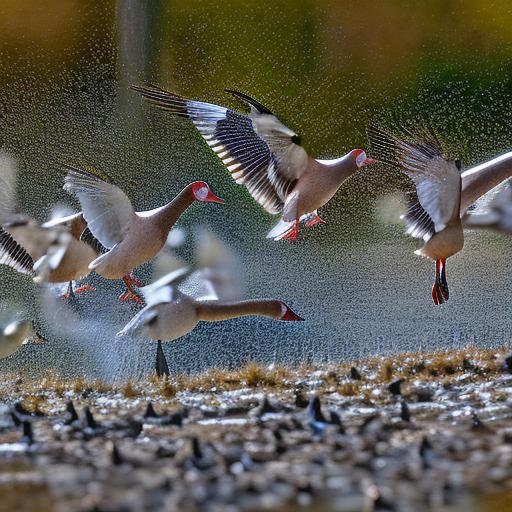Maintaining a clean habitat for geese is of utmost importance for their health and well-being. Geese are highly sensitive creatures that rely on their environment for survival. A clean habitat provides them with the necessary resources to thrive, including clean water, ample food sources, and suitable nesting areas. Without a clean habitat, geese may suffer from various health issues and their populations may decline. Therefore, it is crucial to discuss the importance of maintaining a clean habitat for geese and take action to preserve their natural habitats.
Key Takeaways
- Maintaining a clean habitat is crucial for the health and well-being of geese.
- Zoos play an important role in preserving and protecting geese habitats.
- A clean habitat has a positive impact on the health and well-being of geese.
- The zoo has specific cleaning procedures and uses eco-friendly products to maintain geese habitats.
- Maintaining a clean habitat benefits other animals in the zoo as well.
The Role of the Zoo
Zoos play a vital role in preserving and protecting geese habitats. They serve as conservation centers where geese can be bred and raised in a controlled environment. Zoos also work closely with wildlife organizations and government agencies to implement conservation programs that aim to restore and protect natural habitats for geese. By providing suitable habitats within the zoo, they are able to help geese thrive and increase their population.
Zoos have the resources and expertise to create environments that closely resemble the natural habitats of geese. They carefully design enclosures that mimic the various elements found in the wild, such as ponds, grassy areas, and nesting sites. These habitats are regularly maintained to ensure cleanliness and provide geese with a healthy living space. By creating these habitats, zoos are able to contribute to the preservation of geese populations and educate the public about the importance of maintaining clean habitats.
The Impact of a Clean Habitat
A clean habitat has a significant impact on the health and well-being of geese. When geese have access to clean water sources, they can maintain proper hygiene and avoid waterborne diseases. Clean water also provides them with a suitable environment for feeding and preening, which are essential activities for their survival. Additionally, a clean habitat ensures that geese have access to abundant food sources, which is crucial for their growth and reproduction.
A clean habitat also helps geese live longer and healthier lives. When their environment is free from pollutants and contaminants, geese are less likely to suffer from respiratory issues, skin diseases, and other health problems. They are also less susceptible to predation and can successfully raise their young in a safe and clean environment. Overall, a clean habitat plays a crucial role in the overall well-being and survival of geese populations.
The Zoo’s Cleaning Procedures
Zoos have established cleaning procedures to ensure that geese habitats remain clean and healthy. These procedures involve regular maintenance and monitoring of the habitats to identify any potential issues or areas that require attention. Zookeepers are responsible for cleaning the enclosures, removing waste, and maintaining the cleanliness of the water sources.
Zookeepers follow strict protocols when cleaning geese habitats to minimize stress and disturbance to the animals. They use non-toxic cleaning agents that are safe for the geese and the environment. These cleaning agents effectively remove any waste or debris from the enclosures without leaving harmful residues. Additionally, zookeepers regularly inspect the habitats for any signs of contamination or pollution and take immediate action to address these issues.
Eco-Friendly Cleaning Products
Zoos prioritize the use of eco-friendly cleaning products in geese habitats to minimize their impact on the environment. These products are specifically formulated to be safe for animals, humans, and the ecosystem as a whole. They do not contain harmful chemicals or toxins that could harm geese or other wildlife.
Eco-friendly cleaning products are effective in maintaining a clean habitat for geese without compromising their health or well-being. They are designed to break down organic matter, remove stains, and eliminate odors without leaving behind any harmful residues. By using these products, zoos can ensure that geese habitats remain clean and healthy while also minimizing their ecological footprint.
Benefits for Other Animals

Maintaining a clean habitat for geese also benefits other animals in the zoo. A clean habitat provides a healthy ecosystem where different species can coexist and thrive. For example, clean water sources attract a variety of aquatic organisms, such as fish and amphibians, which serve as food sources for other animals. Additionally, a clean habitat reduces the risk of disease transmission among animals, ensuring their overall health and well-being.
A clean habitat also promotes biodiversity within the zoo. When geese habitats are clean and healthy, it creates a favorable environment for other wildlife, such as insects, birds, and small mammals. These animals play important roles in the ecosystem and contribute to its overall balance. Therefore, by maintaining clean habitats for geese, zoos indirectly support the conservation of various species within their facilities.
The Role of Zookeepers
Zookeepers play a crucial role in monitoring and maintaining geese habitats. They are responsible for observing the behavior and health of the geese on a daily basis. By closely monitoring the geese, zookeepers can quickly identify any signs of illness or distress and take appropriate action.
Zookeepers also play an active role in cleaning geese habitats. They follow strict cleaning protocols to ensure that the enclosures are free from waste and contaminants. This includes regularly removing feces, cleaning water sources, and maintaining the overall cleanliness of the habitat. Zookeepers are trained to handle cleaning agents safely and effectively to minimize any potential risks to the geese or themselves.
Human Activity and Mitigation
Human activity can have a negative impact on geese habitats, but zoos work to mitigate these effects. One of the main challenges is pollution from human waste and chemicals that can contaminate water sources. Zoos implement measures to prevent pollution by properly managing waste disposal systems and using eco-friendly cleaning products.
Zoos also educate visitors about the importance of responsible behavior around geese habitats. They provide information about the potential impact of littering, feeding geese inappropriate food, and other harmful activities. By raising awareness and promoting responsible behavior, zoos can help reduce the negative impact of human activity on geese habitats.
Public Education
Public education plays a crucial role in promoting clean geese habitats. Zoos have educational programs and exhibits that inform visitors about the importance of maintaining clean habitats for geese and other wildlife. They provide information about the impact of pollution, habitat destruction, and other threats to geese populations.
Zoos also organize workshops, guided tours, and interactive activities to engage visitors and teach them about conservation efforts. These educational initiatives aim to inspire individuals to take action and make positive changes in their own lives to help protect geese habitats. By educating the public, zoos can create a collective effort to preserve and maintain clean habitats for geese.
Zoos play a vital role in maintaining clean and healthy habitats for geese. Through their conservation efforts, they are able to protect geese populations and contribute to their overall well-being. By implementing cleaning procedures, using eco-friendly products, and educating the public, zoos ensure that geese habitats remain clean and suitable for their survival. It is important for individuals to recognize the significance of maintaining clean habitats for geese and take action to support these efforts. By working together, we can ensure a bright future for geese populations and the ecosystems they inhabit.
If you’re interested in learning more about how to keep geese and maintain their habitat, you might find this article on poultrywizard.com helpful. It provides valuable information on what to feed ducks, which can also be applied to geese. Understanding their dietary needs is crucial for their overall health and well-being. Check out the article here: https://poultrywizard.com/keeping-ducks/what-should-you-feed-ducks/. Additionally, if you’re curious about the breeding habits of geese, this article on poultrywizard.com explores how many eggs geese lay and offers insights into successful breeding practices. You can read it here: https://poultrywizard.com/breeding-geese/how-many-eggs-do-geese-lay/. Lastly, if you’re considering building a coop for your poultry, including geese or chickens, this article on poultrywizard.com introduces the Snaplock Chicken Coop, a convenient and secure option. Find out more about it here: https://poultrywizard.com/keeping-chickens/snaplock-chicken-coop/.
FAQs
What is the article about?
The article is about how the zoo keeps the habitat of geese clean.
Why is it important to keep the geese habitat clean?
It is important to keep the geese habitat clean to maintain their health and prevent the spread of diseases.
What measures does the zoo take to keep the geese habitat clean?
The zoo takes measures such as regular cleaning of the habitat, removal of waste and debris, and providing clean water for the geese.
What are the benefits of keeping the geese habitat clean?
The benefits of keeping the geese habitat clean include improved health and well-being of the geese, prevention of diseases, and a better environment for visitors to enjoy.
How does the zoo ensure that the geese are not disturbed during the cleaning process?
The zoo ensures that the geese are not disturbed during the cleaning process by using non-intrusive methods and scheduling cleaning during times when the geese are less active.
What can visitors do to help keep the geese habitat clean?
Visitors can help keep the geese habitat clean by not littering, following the zoo’s rules and regulations, and reporting any concerns to zoo staff.
Meet Walter, the feathered-friend fanatic of Florida! Nestled in the sunshine state, Walter struts through life with his feathered companions, clucking his way to happiness. With a coop that’s fancier than a five-star hotel, he’s the Don Juan of the chicken world. When he’s not teaching his hens to do the cha-cha, you’ll find him in a heated debate with his prized rooster, Sir Clucks-a-Lot. Walter’s poultry passion is no yolk; he’s the sunny-side-up guy you never knew you needed in your flock of friends!







